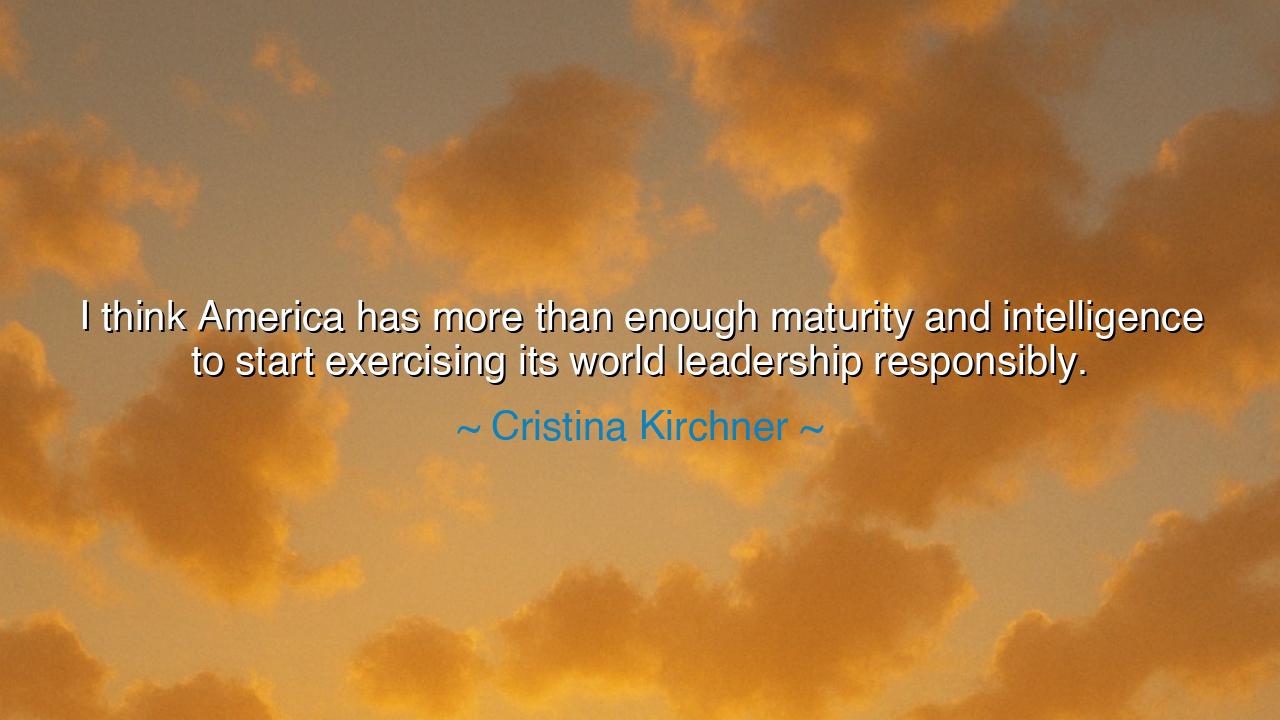
I think America has more than enough maturity and intelligence to
I think America has more than enough maturity and intelligence to start exercising its world leadership responsibly.






The words of Cristina Fernández de Kirchner, former President of Argentina, ring with both challenge and hope: “I think America has more than enough maturity and intelligence to start exercising its world leadership responsibly.” In this statement, she does not merely speak of nations, but of moral awakening, of the moment when power must bow to wisdom and strength must serve justice. Her words are not flattery — they are a summons. They call upon the United States, a nation of vast influence and boundless potential, to rise beyond pride and fear, and to lead not through domination, but through responsibility. This is not the voice of critique alone, but of faith — faith that maturity and intelligence, when united with conscience, can transform the destiny of humankind.
The origin of this quote can be found in Kirchner’s long struggle as both a national and global voice for sovereignty, equity, and justice. She spoke these words during a time when the world grappled with inequality, war, and environmental peril — an era when the influence of the United States stretched into every corner of the globe. As the leader of Argentina, a country often caught between the giants of global politics, Kirchner’s perspective was born of experience and necessity. Her statement recognizes America’s power, but calls for balance — a leadership that uplifts rather than exploits, that listens rather than dictates. She understood that true greatness lies not in how one commands others, but in how one uses strength to nurture peace, fairness, and shared prosperity.
When Kirchner speaks of maturity, she invokes a concept that transcends politics. Maturity is not age — it is understanding, restraint, and self-awareness. It is the ability to see beyond the self and into the needs of others. For a nation, maturity means knowing when to lead and when to listen, when to fight and when to heal. It is a virtue that demands humility before the vast complexity of the world. Intelligence, too, is not mere cleverness or power of calculation. It is the union of insight and empathy — the ability to discern what is right, not simply what is advantageous. America, she believes, has both the wisdom and the heart to lead rightly. The question is whether it will choose to.
History offers many lessons to illuminate her call. In the aftermath of World War II, the United States stood at the pinnacle of power. The world was in ruin, and America, if it had wished, could have ruled as conqueror. Instead, it chose a different path. It rebuilt Europe through the Marshall Plan, transforming enemies into allies, and proving that true leadership is measured not in conquest, but in creation. This act of generosity did not weaken the nation — it made it stronger, earning the trust and admiration of the world. Yet, in later decades, that same power has sometimes stumbled into arrogance — into wars that divided rather than healed, and policies that prioritized dominance over dignity. Kirchner’s words thus echo through time as both a reminder and a plea: that the world still waits for America to lead as it once did — with vision and compassion.
In her statement lies a universal truth: that leadership of any kind — whether of a nation, a community, or a single soul — must evolve from force to wisdom. The immature leader seeks victory; the mature leader seeks harmony. The immature nation builds walls; the mature one builds bridges. The immature mind acts from fear; the mature heart acts from understanding. Thus, when Kirchner speaks of “exercising leadership responsibly,” she describes not only the duty of a superpower, but the duty of every person who holds influence over another life. For in truth, each of us is a leader in some way — in our homes, our work, our friendships, our choices. Her message, though addressed to a nation, speaks to the conscience of humanity itself.
There is also a tone of hope in her words, a belief that change is possible. She does not say America lacks intelligence or maturity; she says it has more than enough — more than it perhaps realizes. The same could be said of all humanity: that we already possess the wisdom to make peace, to cooperate, to protect this fragile Earth. What we lack is not ability, but will. The transformation Kirchner envisions begins when nations — and individuals — choose to act from responsibility instead of impulse, from understanding instead of pride.
So, my children, the lesson of Cristina Kirchner’s words is this: power without wisdom is destruction, but power with responsibility is salvation. To lead is not to stand above others, but to walk beside them, bearing the weight of their hopes with care. The United States, and indeed all nations, must look inward and ask: Are we leading from fear or from love? From ego or from empathy? The same question must be asked by every heart that seeks to guide another.
If we wish to follow her counsel, we must learn to lead responsibly — to use our gifts for the good of all, to measure success not in dominance, but in dignity. Let us act with maturity — thinking before we strike, listening before we speak. Let us act with intelligence — not the intelligence that conquers, but the intelligence that heals. For only then will leadership, whether national or personal, fulfill its truest purpose: to bring light where there is darkness, unity where there is division, and peace where there is unrest. And in that sacred balance between strength and compassion, the world will find not only America’s greatness, but the greatness of all humankind.






AAdministratorAdministrator
Welcome, honored guests. Please leave a comment, we will respond soon